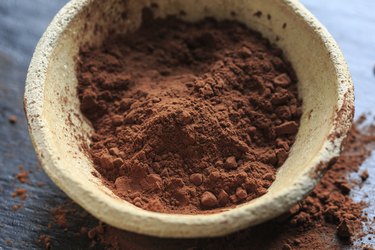
When you're enjoying a cup of steaming hot cocoa on a chilly day, you may not be concerned about the amount of caffeine in cocoa powder. If you're watching your daily caffeine intake, however, add cocoa to the wide-ranging list of foods that contain some amount of this aromatic, flavorful stimulant.
Tip
Cocoa powder naturally contains a substantial amount of caffeine. A 100-gram (or 3.5 ounce) serving of unsweetened cocoa powder has 230 milligrams of caffeine, states the USDA.
Video of the Day
Caffeine in Cocoa Powder
The amount of caffeine in cocoa powder is more of an afterthought, as you're likely focused on the powder's appealing smell and palate-pleasing uses. However, cocoa powder does contain a notable amount of caffeine.
Video of the Day
The USDA states that 100 grams, or 3.5 ounces, of (unsweetened) cocoa powder contains 230 milligrams of caffeine. If you have a caffeine sensitivity, the caffeine in cocoa powder is a figure to keep in mind.
The emergence of decaffeinated cocoa powder may address that concern. The October 2013 edition of the journal Foods detailed a process designed to reduce cocoa powder's caffeine levels. The resultant cocoa powder would still retain functional components such as polyphenols and theobromine while greatly reducing caffeine's negative effects on your body.
The decaffeination process removed 80.1 percent of the cocoa powder's caffeine while retaining almost all of the polyphenols and theobromine. Therefore, researchers conclude that it's feasible to remove most of the caffeine from high-cocoa food products, including dark chocolate, while retaining the foods' functional components.
What's the Difference Between Cacao and Cocoa?
Let's compare cocoa to cacao, another plant-based substance with a similar spelling but different name. What's the difference between cacao and cocoa?
Simply put, cacao and cocoa come from the same source, although they're processed differently. The University of Massachusetts Medical School explains that cacao powder is derived from unroasted cacao beans that were then cold pressed. Cacao nibs are chopped-up cacao beans that have also become well known in culinary circles.
Cocoa powder is roasted raw cacao that has been ground into a fine powder. Because the two powders are derived from the same source, they both contain caffeine.
Although cocoa powder undergoes more processing than cacao powder, it still has some nutritional benefits. Specifically, cocoa powder is rich in beneficial minerals and polyphenols. In addition, cocoa powder doesn't contain the sugar and salt found in commercial cocoa mix.
Cocoa also acts as a fiber-rich prebiotic that encourages "good" gut bacteria growth. In turn, this promotes better digestive system health.
Read more: What Are the Health Benefits of Cocoa & Coffee?
Is Cocoa Better Than Coffee?
In a head-to-head comparison between cocoa and coffee, cocoa offers an important nutritional benefit. Cocoa is rich in flavanols, a plant-based nutrient present in many foods and beverages, states Harvard Health Publishing. Flavanols are especially concentrated in cacao beans, which are used to produce chocolate.
Versatile cocoa flavanols have been proven to improve blood circulation to the brain and heart, prevent dangerous blood clots, help decrease blood pressure and combat cell damage.
Coffee also appears to offer several health-related benefits, notes a study published in the June 2017 issue of Planta Medica. The report summarized numerous research efforts, which collectively suggest that coffee consumption may contribute to the prevention of chronic conditions such as liver disease and Type 2 diabetes.
At the same time, many associated studies have found that coffee doesn't significantly increase your cardiovascular disease risk. Decaffeinated coffee is believed to provide some of the same benefits, indicating the presence of other health-promoting components .
Read more: 14 Legit Ways Coffee Can Boost Your Health
Caffeine in Cocoa vs. Coffee
While a 3.5-ounce portion of unsweetened cocoa powder contains 230 milligrams of caffeine, coffee's caffeine content can vary widely for a number of reasons. The Mayo Clinic states how a coffee's source, processing method, brewing technique and brewing time all play a role.
For example, an eight-ounce cup of brewed regular coffee contains anywhere from 95 to 165 milligrams of caffeine. A one-ounce serving of brewed espresso has 47 to 64 milligrams of caffeine in it.
In contrast, eight ounces of brewed decaf coffee has a minimal two to five milligrams of caffeine. A one-ounce serving of espresso decaf contains zero caffeine.
High levels of caffeine consumption can lead to some unwelcome side effects. If you've experienced anxiety, restlessness or headaches, note how much coffee you drink daily. If you consume more than 400 milligrams of caffeine each day, it may be appropriate to reduce your coffee intake. Consider replacing one or two cups of your favorite caffeinated coffee with the decaf version.
- USDA FoodData Central: "Cocoa, Dry Powder, Unsweetened"
- University of Massachusetts Medical School: "Chocolate: It’s Okay to Indulge!"
- Harvard Health Publishing: "Cocoa: A Sweet Treat for the Brain?"
- Planta Medica: "The Impact of Coffee on Health"
- Mayo Clinic: "Caffeine Content for Coffee, Tea, Soda and More"
- U.S. National Library of Medicine: “Polyphenol-Retaining Decaffeinated Cocoa Powder Obtained by Supercritical Carbon Dioxide Extraction and Its Antioxidant Activity.”